Business
Trump announces new tariffs on trucks, drugs and kitchen cabinets
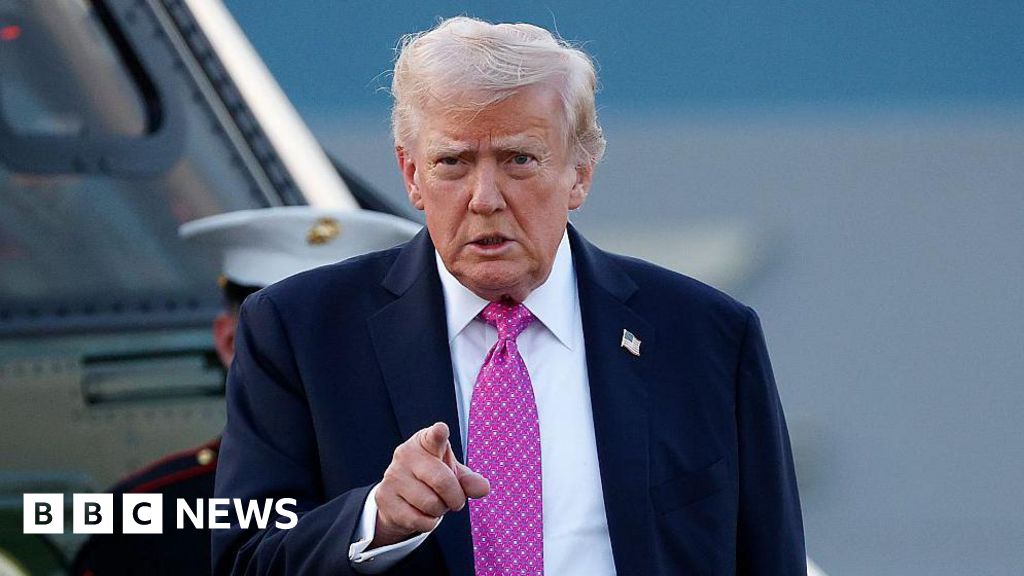
Osmond Chia and
Charlotte Edwardsbusiness reporters
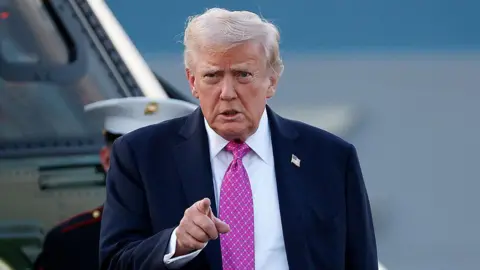 Getty Images
Getty ImagesUS President Donald Trump has announced a new wave of tariffs, including a 100% levy on branded or patented drug imports from 1 October unless a company is building a factory in the US.
Washington will also impose a 25% import tax on all heavy-duty trucks and 50% levies on kitchen and bathroom cabinets, the president said as he unveiled the industry-focused measures.
“The reason for this is the large scale ‘FLOODING’ of these products into the United States by other outside Countries,” Trump wrote on his Truth Social platform on Thursday, citing the need to protect US manufacturers.
The announcements come despite calls from US businesses for the White House to not impose further tariffs.
However, Neil Shearing, chief economist at Capital Economics, said the tariff announcement on pharmaceuticals was “not quite as big a move as it appears at first sight”.
This was due to the exemptions available to generic drugs and to those firms building factories in the US.
“Many of the world’s largest pharmaceutical companies either already have some production in the US or have announced plans to build production in the near future,” he said.
The European Federation of Pharmaceutical Industries and Associations has called for “urgent discussions” to make sure Trump’s plans for new tariffs do not cause any harm to patients in the EU or the US.
The UK exported more than $6bn (£4.5bn) worth of pharmaceutical products to the US last year, according to the United Nations.
In the trade agreement signed by the US and UK in June the two countries said they intended to negotiate “significantly preferential treatment outcomes on pharmaceuticals”.
In response to Trump’s latest announcement, a UK government spokesperson said: “We know this will be concerning for industry, which is why we’ve been actively engaging with the US and will continue to do so over the coming days.”
Among the UK’s biggest pharmaceutical companies, GlaxoSmithKline already has US manufacturing plants and last week pledged to invest $30bn (£22bn) in research and manufacturing in the US over the next five years.
AstraZeneca also has plants in the US and in July said it planned to invest $50bn in the country by 2030.
William Bain, head of trade policy at the British Chambers of Commerce, said: “The UK’s leading pharmaceutical companies have committed to significant investment in the US, including in advanced manufacturing. We believe this should give them protection from any new duties.”
In the past couple of weeks, several pharmaceutical companies have pulled investment from the UK, citing a poor environment for the sector.
But Jane Sydenham, investment director at Rathbones, said the need to focus on the US was a key factor in these decisions.
“I think there’s been this ongoing narrative that the UK can’t attract investment and we’re a low growth economy,” she told the BBC’s Today programme.
“But the reality in this particular sector is that it is really more about Donald Trump’s agenda and the uncertainty that’s creating for these companies and where they might need to invest to handle the tariff proposals.”
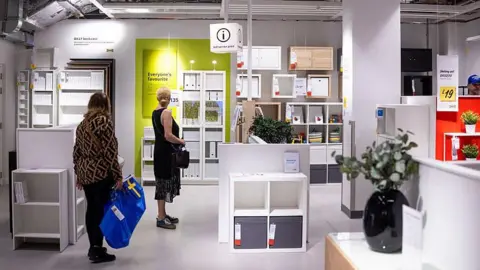 Bloomberg via Getty Images
Bloomberg via Getty ImagesThe tariffs on heavy trucks would protect US manufacturers from “unfair outside competition” and the duties would help lift American companies such as Peterbilt and Mack Trucks, Trump said.
The new levies on kitchen and bathroom cabinets, as well as some other furniture, were in response to high levels of imports, which hurt local manufacturers, the president said.
He added that the US would start charging a 30% tariff on upholstered furniture from next week.
Swedish furniture giant Ikea said the tariffs on furniture imports make doing business “more difficult”.
“The tariffs are impacting our business similarly to other companies, and we are closely monitoring the evolving situation.”
Trump’s tariff policies have been a key feature of his second term in the White House.
His sweeping tariffs on more than 90 countries came into effect in early August, as part of his policies aimed at boosting jobs and manufacturing in the US, among other political goals.
Trump had previously imposed sector-specific tariffs on steel, copper, aluminium, cars and vehicle components.
Earlier this year, the US Chamber of Commerce urged the White House to not introduce new tariffs, arguing that many parts used in truck production are sourced “overwhelmingly” from countries like Mexico, Canada, Germany, Finland and Japan.
Mexico and Canada are among the biggest suppliers of parts for medium and heavy-duty trucks, accounting for more than half of total US imports in the sector last year, said the chamber.
It warned that it was “impractical” to expect many of these parts to be sourced domestically, resulting in higher costs for the industry.
The new tariffs favour domestic producers but are “terrible” for consumers as prices are likely to rise, said trade expert Deborah Elms from research firm Hinrich Foundation.
The levies would cover more products at higher rates than Trump’s reciprocal tariffs, which were aimed at correcting trade imbalances with other countries.
These industry-specific import taxes could serve as a back-up plan to secure revenues as Trump’s sweeping duties on global trading partners are being challenged in court, said Ms Elms.
Business
Beyond oil: How US-Iran war & Middle East crisis may hit India’s economy – sector-wise impact explained – The Times of India

Beyond oil, the Middle East crisis has other implications for the Indian economy, especially if the US-Israel-Iran war continues for a long duration leading to major supply disruptions. In recent days, a series of missile and drone attacks have struck multiple energy and logistics installations across the Gulf region. These incidents have heightened concerns that shipments of oil and gas moving through the Strait of Hormuz – a vital artery for global energy trade – could face disruption.Between March 1 and March 3, important facilities in Saudi Arabia, Qatar, the United Arab Emirates and Oman came under attack. The situation has fueled concerns that the conflict could trigger a wider shock to global energy supplies.But beyond oil, it’s important to note that West Asia plays an important role in supplying India with essential commodities. In 2025, India’s imports from the region of approximately $98.7 billion included critical resources such as energy, fertilisers and industrial inputs.
1. Oil: Immediate risk
Petroleum is the most immediate area of exposure. In 2025, India sourced roughly $70 billion crude oil and petroleum products from West Asia.“Crude oil feeds India’s refineries, which produce petrol, diesel, aviation fuel and petrochemical feedstocks used across the economy. India has about 30 days of stocks, any prolonged disruption in shipments could quickly push up fuel prices, raising transport and logistics costs and feeding into inflation. Farmers would also feel the pressure through higher diesel prices for irrigation pumps and tractors,” says Ajay Srivastava, founder of Global Trade Research Initiative (GTRI).Also Read | Russian crude to rescue! Ships carrying Russia’s oil head to India amid Middle East supply shock: Report
2. LNG Supplies
Supplies of natural gas are also exposed to potential disruptions. In 2025, India sourced liquefied natural gas or LNG worth $9.2 billion from West Asia, which is around 68.4% of its total LNG imports. LNG is also a key input for fertilizer manufacturing units, gas-fired power plants and city gas distribution systems that provide compressed natural gas (CNG) for vehicles and piped gas for household cooking.Signs of this vulnerability have already emerged. Qatar’s Petronet LNG halted LNG deliveries to GAIL starting March 4, 2026 due to restrictions affecting vessel movement.
3. Risks to LPG
Liquefied petroleum gas (LPG) imports from West Asia were $13.9 billion in 2025, making up 46.9 % of India’s total LPG purchases. LPG continues to serve as the main cooking fuel for millions of households. With reserves covering only about two weeks of consumption, any interruption in supply could quickly impact the availability of cooking fuel.
4. Exposure in Fertiliser Supplies
India’s agricultural sector could also feel the impact through fertiliser imports, says GTRI in its report. In 2025, fertiliser purchases from West Asia stood at $3.7 billion. Any disruption in supplies during the crop cycle could lead to reduced fertilizer availability, increase the government’s subsidy burden and eventually push up food prices.Also Read | India’s energy security exposure to Middle East: How much oil, LPG, LNG reserves do we have?
5. Diamond Trade and Exports
India’s diamond export sector is also closely tied to supplies from the Gulf. Diamonds of around $6.8 billion were imported from the Middle East in 2025, which is 40.6% of its total imports of these stones. Rough diamonds are in turn processed in India’s cutting and polishing centres, especially in Gujarat’s Surat, before being exported to international markets as polished gems. Any interruption in the flow of raw diamonds could slow manufacturing activity and have an impact on employment within the jewellery industry.
6. Industrial Raw Material Supplies
A number of industrial inputs sourced from the Gulf are also crucial for India’s manufacturing sector. India bought polyethylene polymers of around $1.2 billion from West Asia in 2025. Polyethylene is widely used in products such as packaging materials, plastic piping, storage containers, consumer goods and agricultural films used in irrigation systems.
7. Construction-Related Materials
India’s construction industry also relies heavily on mineral imports from the region. In 2025, the country imported limestone worth $483 million from West Asia. Limestone is a key ingredient in cement production, and hence any shortage could raise the cost of cement, thereby possibly slowing infrastructure development.
8. Metals Supply Chains
Supply links with West Asia also extend to the metals sector. India imported direct reduced iron of around $190 million from the Middle East region in 2025. Additionally, the country sourced copper wire worth $869 million from West Asia. Copper wire is widely used in power transmission networks, electrical machinery and renewable energy infrastructure.As GTRI notes: Together, these figures highlight how closely India’s economy is tied to West Asian supply chains. “If disruptions to shipping through the Strait of Hormuz continue beyond a week, the effects could quickly spread from energy markets to fertiliser supplies, manufacturing inputs, construction materials and export industries such as diamonds. What begins as a regional conflict could rapidly evolve into a broader supply shock for the Indian economy,” the GTRI report concludes.
Business
Aviva flags potential for Iran conflict to send claims costs rising

The boss of insurer Aviva has cautioned that a lengthy conflict in the Middle East could send the cost of vehicle parts and repairs surging in an echo of the aftermath seen after Russia’s invasion of Ukraine.
Chief executive Amanda Blanc said the group has seen limited claims so far relating to the US-Israel war with Iran, but flagged the potential for claims costs to jump if supply chains are badly disrupted for a long time.
She said: “We have a good case study on this in terms of the Ukraine situation back in 2022 and the impact on the supply chain, which had an inflationary impact on vehicle parts and replacement vehicles.
“Obviously, if this goes on for a prolonged period of time, we would expect that this could have some impact, but to speak about this from an Aviva perspective, we are very well placed to manage that with our supply chain and our owned garage network.”
Ms Blanc added: “We will take action as necessary to make sure we look after our customers and price accordingly for any new inflationary impact.”
She said there had been “very limited” travel claims so far.
Ms Blanc added: “We have had calls from customers asking about whether they should travel and those sorts of things, and we are pointing them to the Foreign Office guidance on that.”
Full-year results from Aviva on Thursday showed annual earnings leaped 25% higher, while the firm also announced it was resuming share buybacks as it continues to benefit from its £3.7 billion takeover of Direct Line.
The group unveiled an earnings haul of £2.2 billion for 2025, up from £1.8 billion in 2024, including a £174 million contribution from Direct Line, helping the group hit its financial targets a year early.
Aviva unveiled a £350 million share buyback after putting these on hold due to the Direct Line deal, which completed last year.
Ms Blanc cheered an “outstanding performance”.
She said: “We have transformed Aviva over the last five years and whilst we have made significant progress, there is so much more to come.”
Artificial intelligence (AI) is also a big area of focus for the firm, according to Ms Blanc.
“We have clear strengths in artificial intelligence which are creating major opportunities to transform claims, underwriting and customer experience,” she said.
Business
South East Water faces £22m fine for supply failures
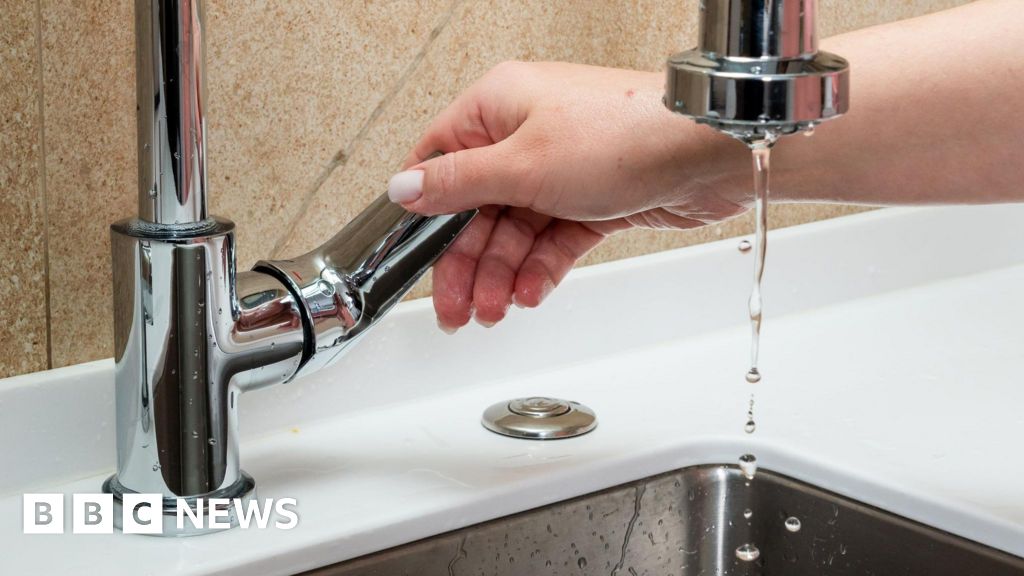
The firm was unable to cope during high demand, Ofwat says, leading to “immense stress” for customers.
Source link
-

 Politics1 week ago
Politics1 week agoWhat are Iran’s ballistic missile capabilities?
-

 Business6 days ago
Business6 days agoIndia Us Trade Deal: Fresh look at India-US trade deal? May be ‘rebalanced’ if circumstances change, says Piyush Goyal – The Times of India
-
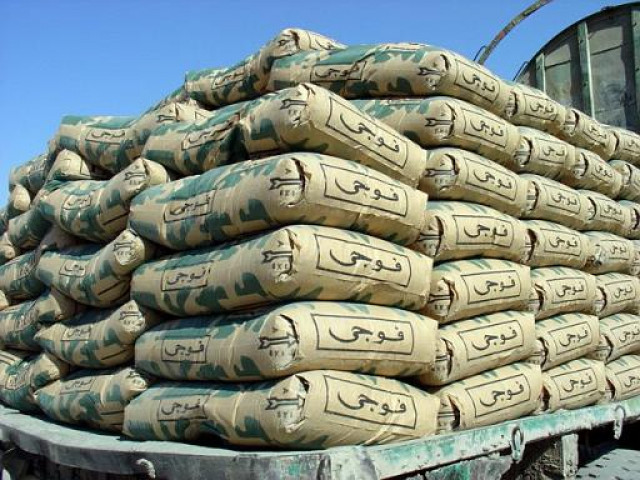
 Business7 days ago
Business7 days agoAttock Cement’s acquisition approved | The Express Tribune
-

 Politics1 week ago
Politics1 week agoUS arrests ex-Air Force pilot for ‘training’ Chinese military
-

 Business1 week ago
Business1 week agoHouseholds set for lower energy bills amid price cap shake-up
-

 Fashion7 days ago
Fashion7 days agoPolicy easing drives Argentina’s garment import surge in 2025
-
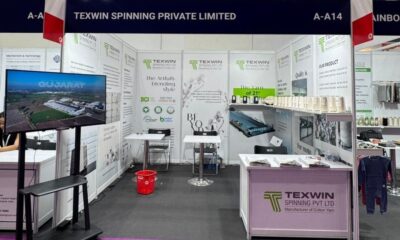
 Fashion6 days ago
Fashion6 days agoTexwin Spinning showcasing premium cotton yarn range at VIATT 2026
-

 Sports6 days ago
Sports6 days agoLPGA legend shares her feelings about US women’s Olympic wins: ‘Gets me really emotional’






